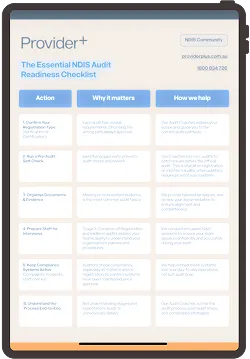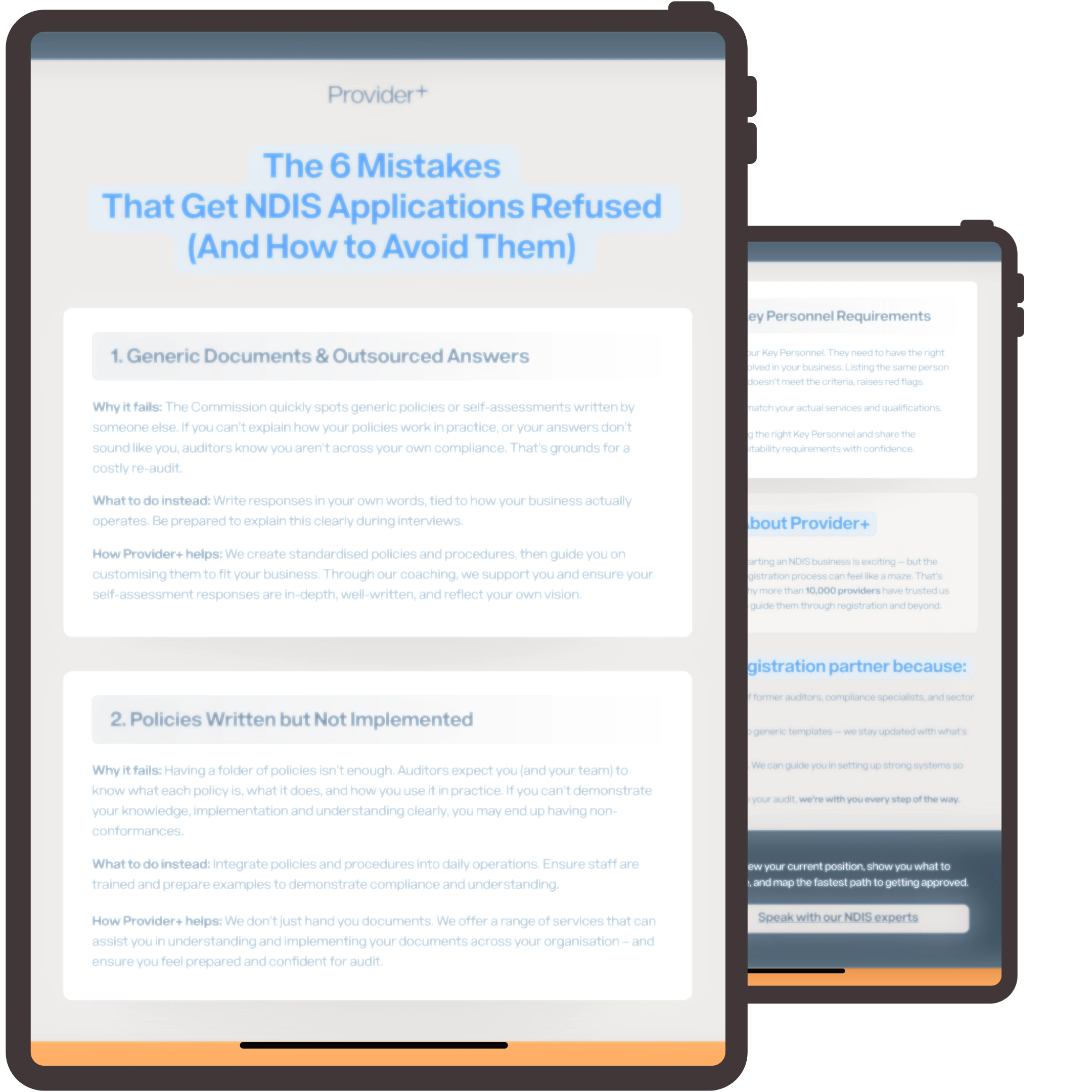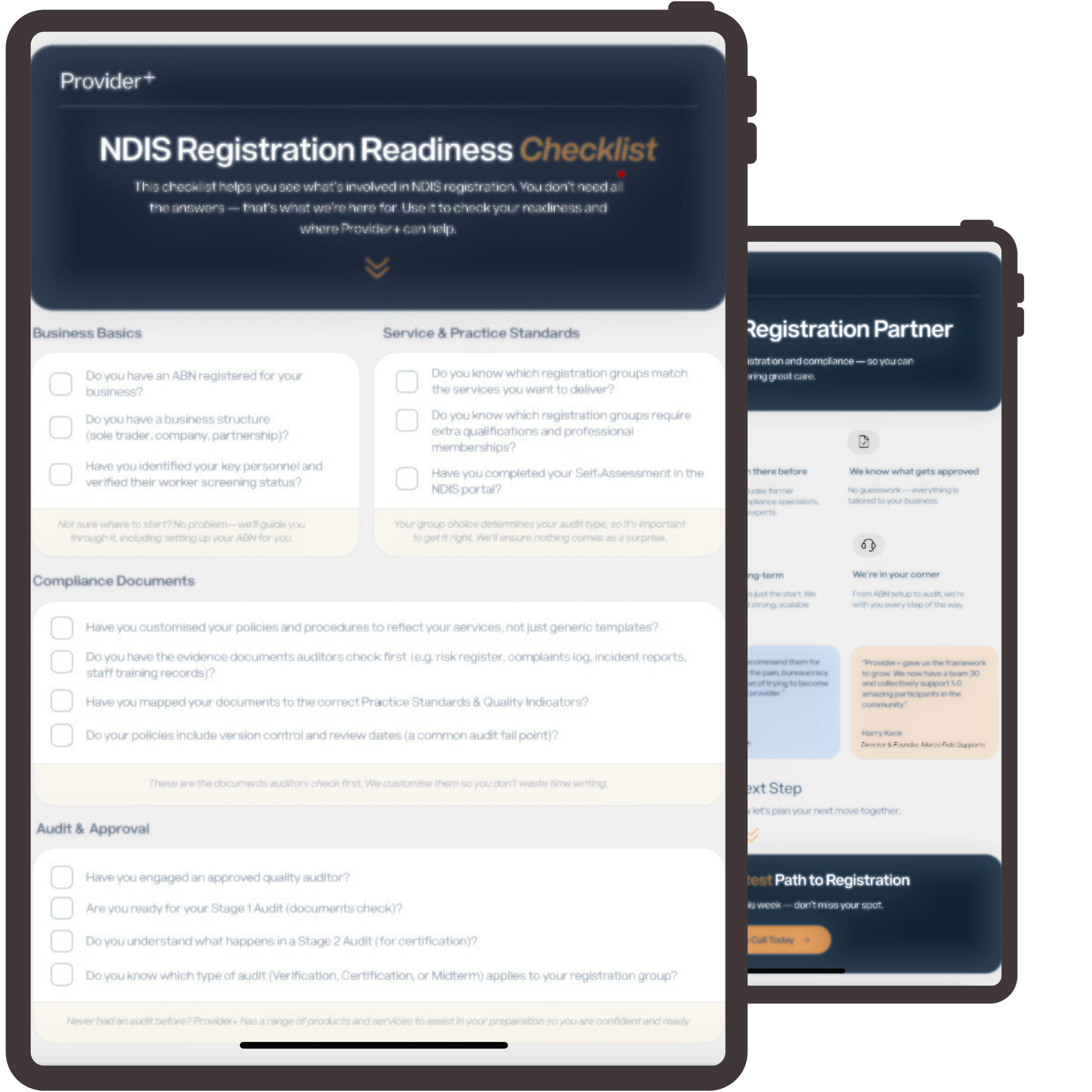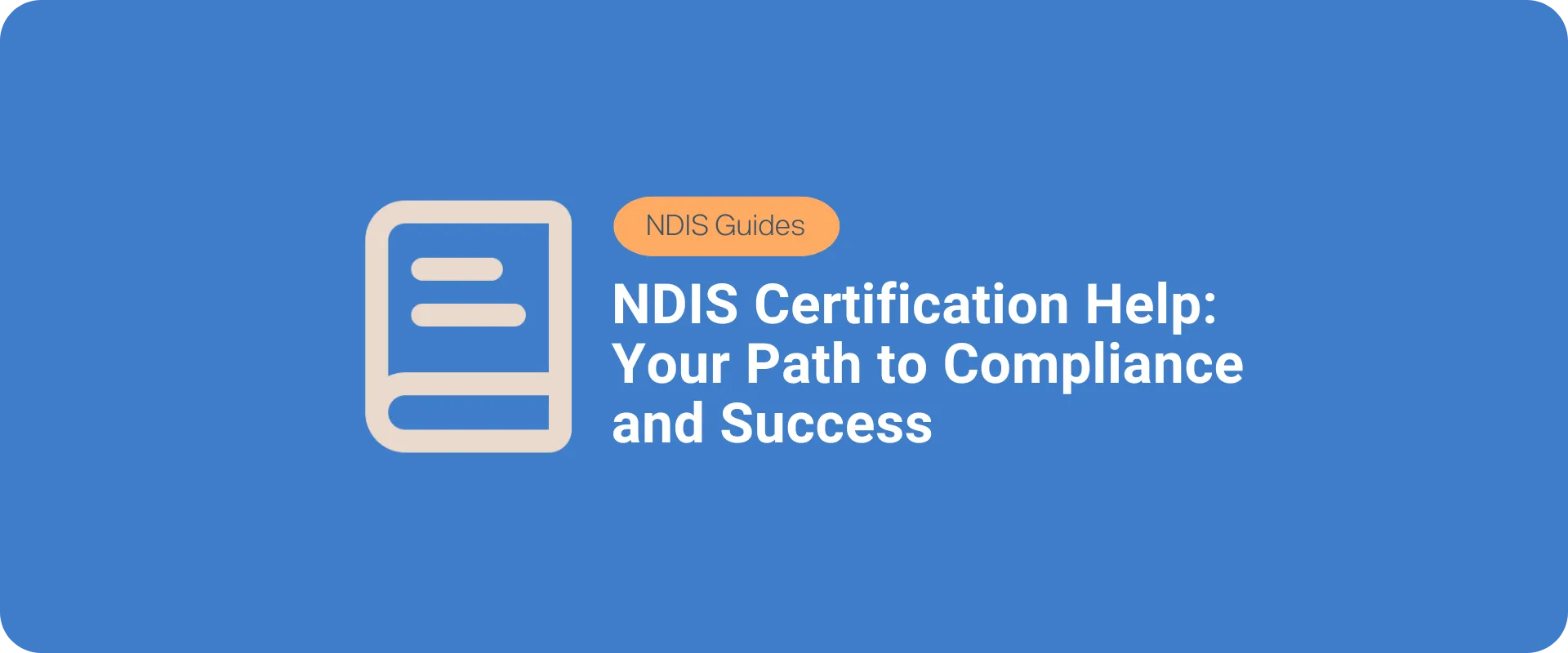NDIS Certification Help: Your Path to Compliance and Success
Understanding NDIS Certification: A Guide to the Process
Becoming an NDIS (National Disability Insurance Scheme) certified provider can seem complex, but it's a vital step in ensuring the quality and safety of the services you offer to individuals with disabilities. Achieving NDIS certification not only enhances your service quality but also demonstrates your commitment to supporting NDIS participants. This blog aims to simplify the process of getting NDIS certification, providing you with the essential steps to navigate the journey successfully.
What is NDIS Certification?
At its core, NDIS certification ensures that providers meet a set of standards established by the NDIS Commission known as the NDIS Practice Standards. These standards are designed to guarantee that providers offer high-quality and safe services to individuals with disabilities. To become NDIS certified, providers must demonstrate their ability to meet these requirements.
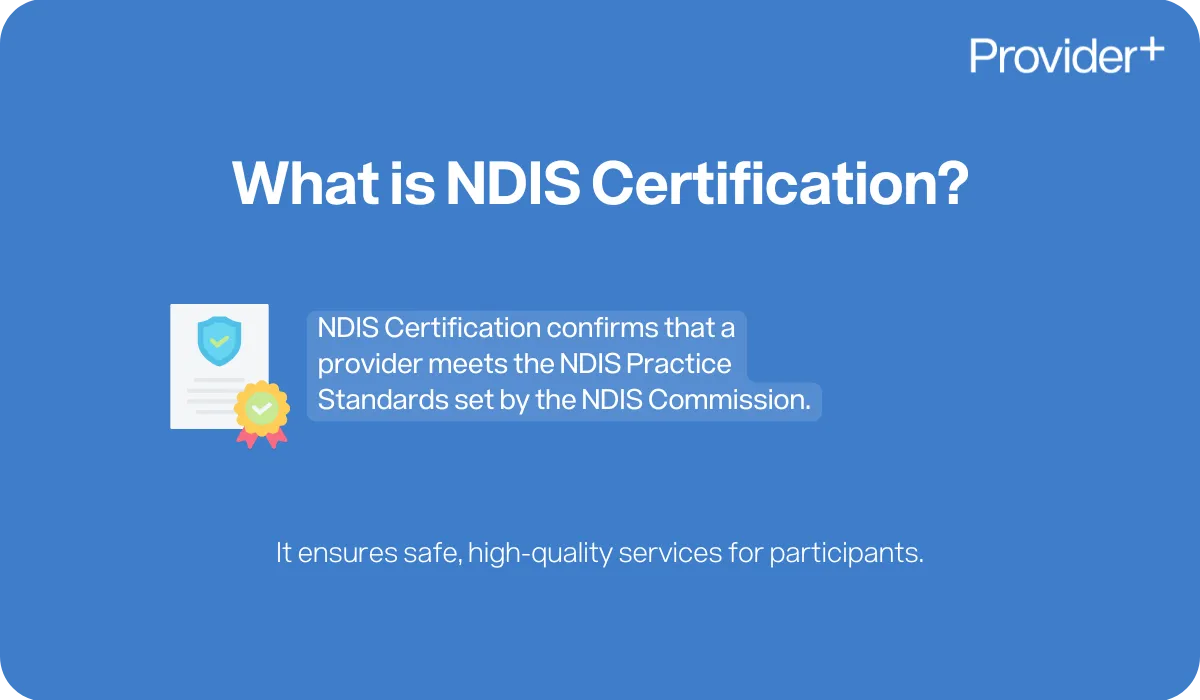
Here's a breakdown of what you need to know:
Key Documentation for NDIS Certification
As part of the NDIS certification process, you'll need to establish a thorough documentation system.
Key documents include:
- Policies & Procedures: These should outline your operational guidelines, detailing how you manage risks, ensure safety, handle complaints, and maintain service quality. Each policy should align with NDIS Practice Standards and prioritise participant rights and wellbeing.
- Worker Screening & Staff Records: Keeping detailed records of staff qualifications, training, supervision and background checks is essential. This shows that your team is equipped to deliver support services effectively and safely.
- Participant Feedback and Complaint Systems: Documentation of how you collect, analyse, and act on feedback or complaints from participants is critical for continuous improvement and service quality.
- Service Delivery Evidence: Case studies, progress reports, or participant success stories are valuable in showcasing how your services have positively impacted participants' lives in line with the NDIS Practice Standards and NDIS Code of Conduct.
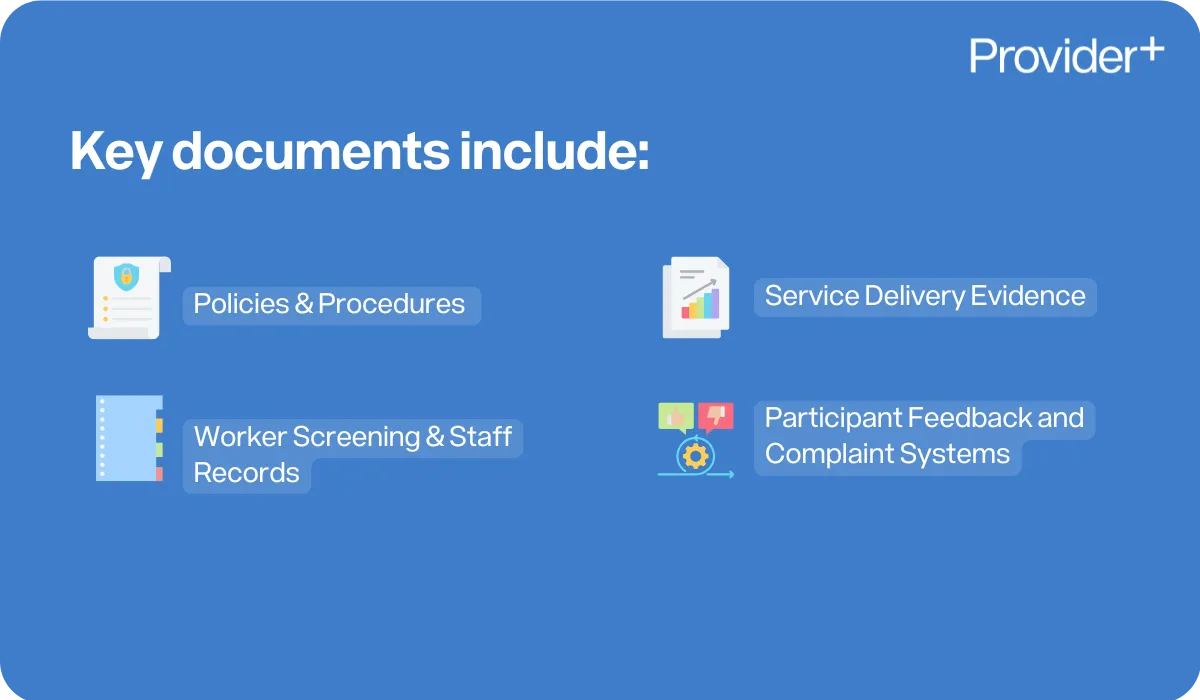
Why Compliance Matters
Compliance with these standards is not just about following regulations—it’s about providing and being able to deliver services of the highest quality of to those individuals most vulnerable within your community. Meeting NDIS certification requirements demonstrates your commitment to excellence, safety, and trustworthiness.
NDIS Certification Audit Checklist: Your Guide to Compliance
The NDIS certification audit checklist is an essential tool that outlines the criteria auditors will assess during the certification process. Familiarising yourself with this checklist will help ensure you're well-prepared.
Here’s an overview of what auditors will review:
- Governance & Operational Management: This section examines how your organisation’s structure and leadership support NDIS service delivery. It looks at your operational planning, service review processes, and how you handle complaints.
- Provision of Supports: Auditors will evaluate how well your services meet individual participant needs, preferences, and goals. This includes your ability to tailor services and deliver them effectively.
- Participant Rights & Provider Responsibilities: Protecting the rights of participants, such as privacy and dignity, is fundamental. This section also focuses on your ethical conduct and transparent service provision.
- Risk Management: Identifying and managing risks is crucial to ensuring safety for both participants and staff. Auditors will assess your risk identification and mitigation strategies.
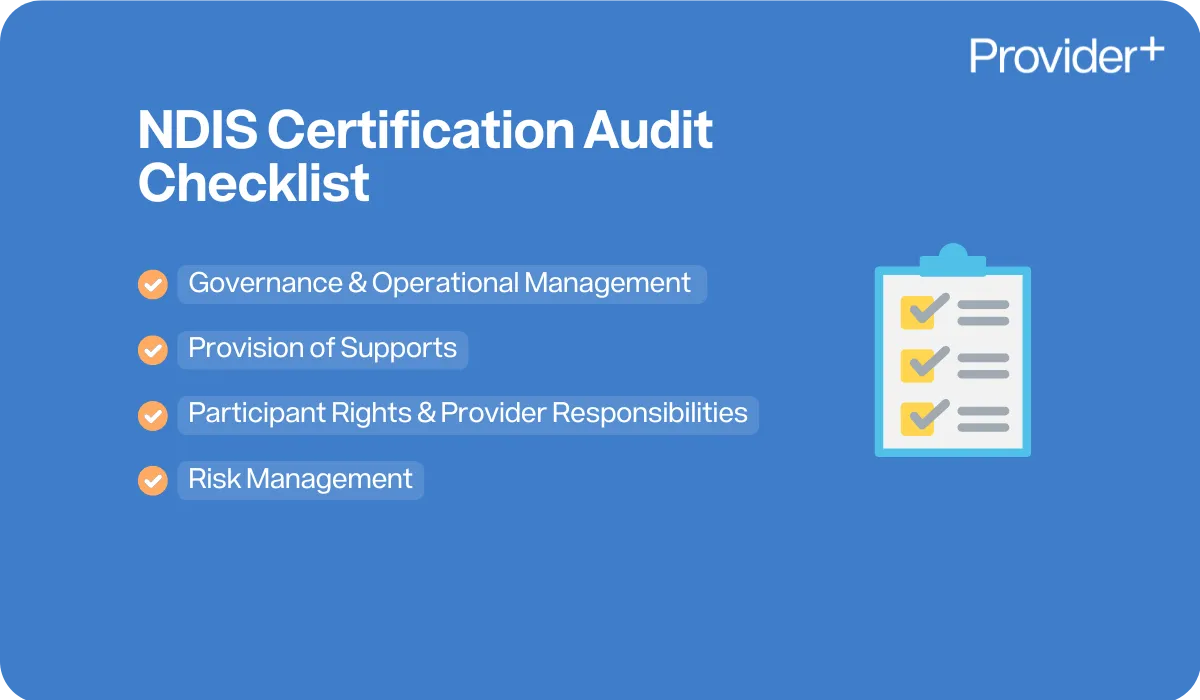
Step-by-Step Guide to Achieving NDIS Certification
1. Application Process
The first step to becoming a registered NDIS provider is to complete the registration application within the NDIS Commission's application's portal in PRODA (Provider Digital Access).
2.Submit Your Application
Once you have successfully completed all fields within the application, the next step in the certification process is to submit the application via the NDIS Commission portal. Your application should outline your organisation's structure and services, demonstrating your readiness to meet NDIS requirements. An Initial Scope of Audit will then be generated.
3. Prepare Your Documents
Gather all necessary documentation to prove compliance with NDIS standards.
Key documents include:
- Worker qualifications and training records
- Service delivery policies, procedures and intended forms;
- Participant feedback systems
Ensure these documents are organised and easily accessible. Consider using digital storage solutions to streamline access.
3. Engage an Approved Quality Auditor
Once your documents are in order, you'll need to engage an NDIS-approved quality auditor. Choose an auditor from the NDIS Commission’s approved list who aligns with your organisation’s values and service type. Collaborate with your auditor to ensure your team is fully prepared for the audit.
4. The Certification Audit
The certification audit is your chance to showcase how your organisation intends to provide services that meet the NDIS Practice Standards. Auditors will review your documents and may conduct site visits or interviews with staff and participants to assess compliance in action.
NDIS Providers undertaking a certification audit will be required to undertake a two stage audit process. Stage 1 consists of a desktop audit reviewing policies, procedures, key personnel suitability and template version of intended forms. A Stage 2 audit is then conducted within 3 months of a Stage 1 audit assessing the implementation of the system assessed during the Stage 1 audit.
5. Address Feedback & Maintain Compliance
After the audit, you may receive feedback or requests for additional documentation. Address these promptly to move closer to certification. As the audit comes to a close, your Auditor will advise of any outcomes or findings before providing a recommendation for certification to the NDIS Commission. It’s essential to continually monitor and improve your processes to maintain compliance and uphold NDIS standards.
6. Registration Approval Timeframe
The current registration process for approval by the NDIS Commission is approximately 12 months (less for lower risk services). Whilst you are waiting for your registration approval, you can operate as an unregistered provider supporting plan and self managed participants, with the exception of:
- Behaviour Support services (Registration Group 0110 - Module 2 and Module 2a)
- Plan Management (Registration Group 0127)
- Specialist Disability Accommodation (Registration Group 0131- Module 5)
7. Certification Audit Cycle
Following on from your Certification registration approval, Certified providers are required to undertake an audit cycle every 18 months, with the first audit conducted 18 months post registration more commonly known as a Mid term audit. The audit cycle then continues the 18 month cycle which approaches 3 years since registration resulting in a Registration renewal. There are exceptions to the certification audit cycle for some registered providers.
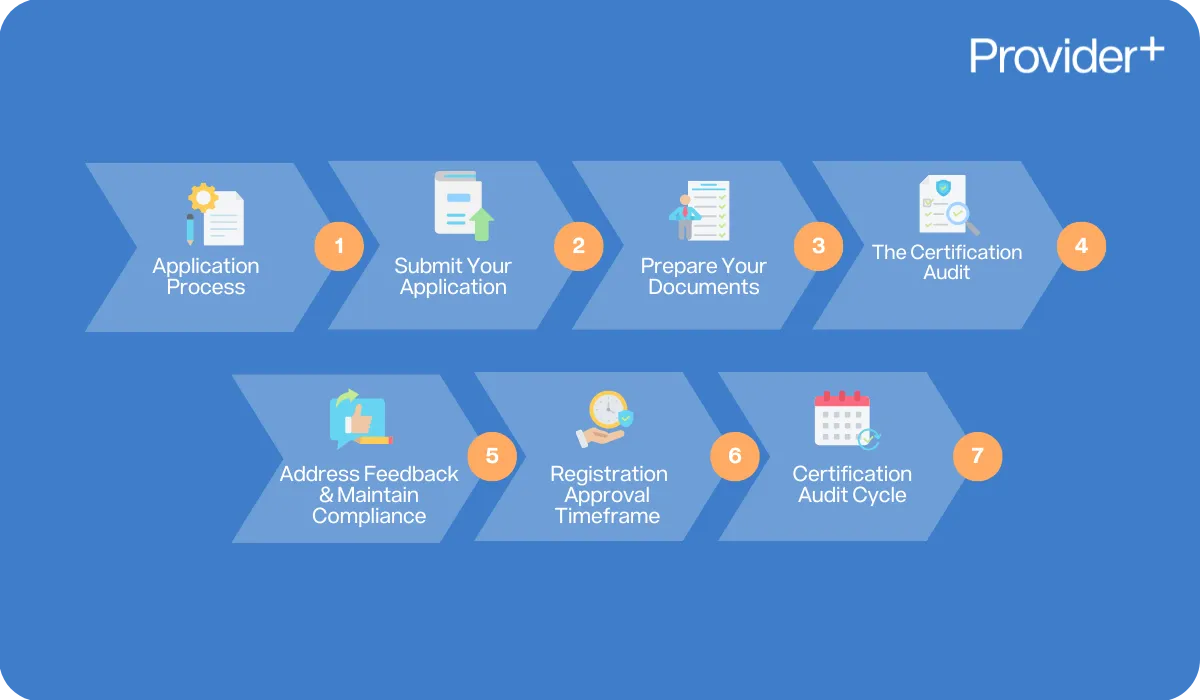
Expert Support for NDIS Certification
Navigating the NDIS certification process can be challenging, which is why seeking expert guidance can be incredibly helpful. Organisations like Provider+ specialise in NDIS certification and audit support, offering insights and assistance to streamline the application and audit process. Online resources, including detailed guides and checklists, webinars, and community forums, are also available for additional support.
Common Challenges and How to Overcome Them
Understanding Complex Standards
The NDIS Standards can be complex, and many providers struggle to interpret them. To tackle this, break down the standards into manageable sections and use plain language summaries. Consider seeking advice or attending workshops to simplify the standards and gain clarity.
Filling Gaps in Documentation
Incomplete or missing documentation can delay the certification process. An internal audit using the NDIS certification checklist can help identify gaps in your records. Implementing document management software can help you keep track of necessary updates and reviews.
Leveraging Technology for NDIS Certification
Digital Compliance Management Tools
Using digital tools can simplify compliance by helping you track staff training, manage documents, and ensure that critical records are always up-to-date.
Online Platforms for Assistance
There are numerous online platforms that offer guidance and resources for NDIS certification, ensuring you stay informed on the latest requirements and best practices.
Conclusion
Achieving NDIS certification is a significant milestone for any service provider committed to delivering quality support to individuals with disabilities. By preparing well, staying organised, and seeking expert help, you can navigate the certification process with confidence and success. Ultimately, certification isn’t just about meeting regulatory requirements—it’s about enhancing the lives of NDIS participants through high-quality, person-centered services.
